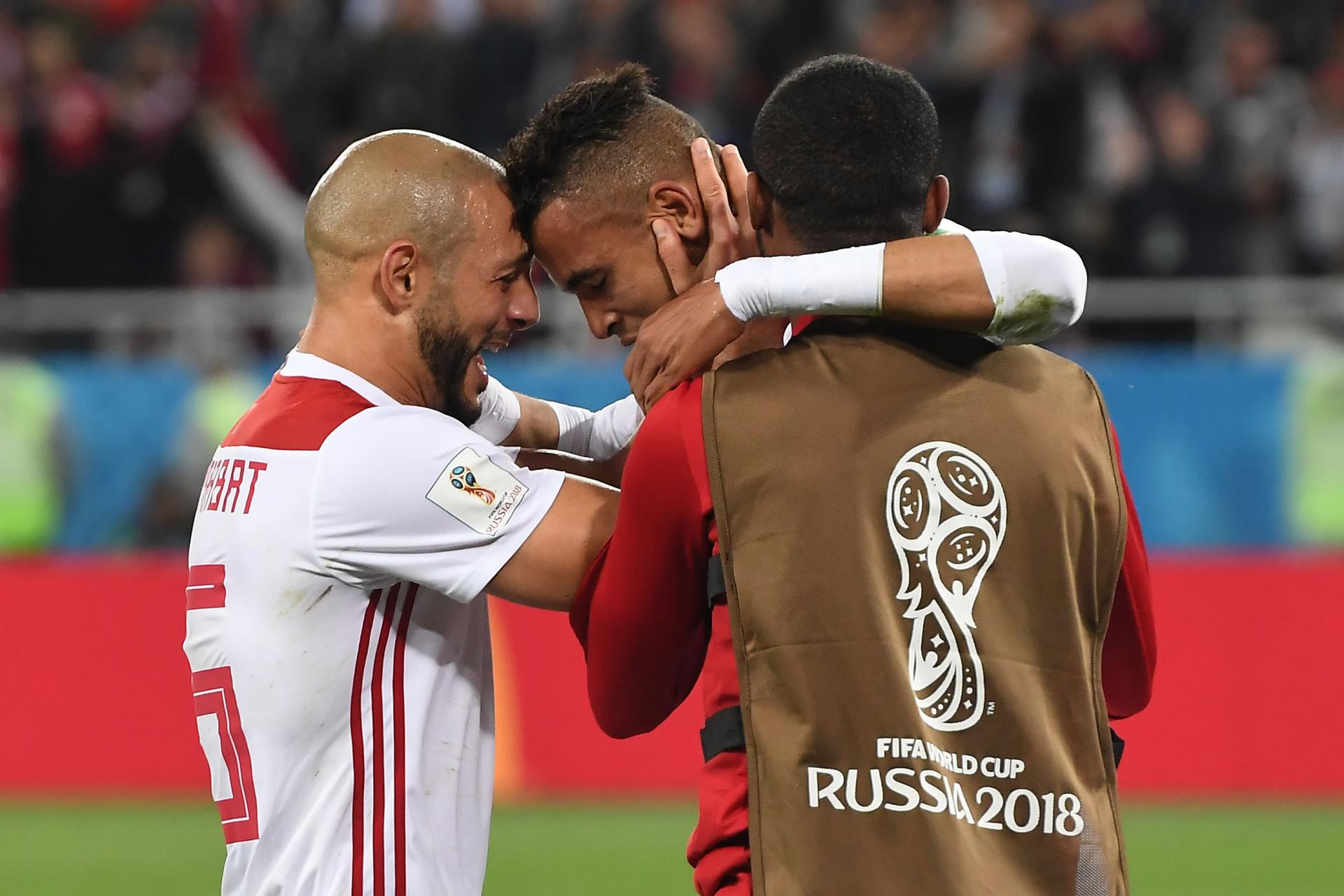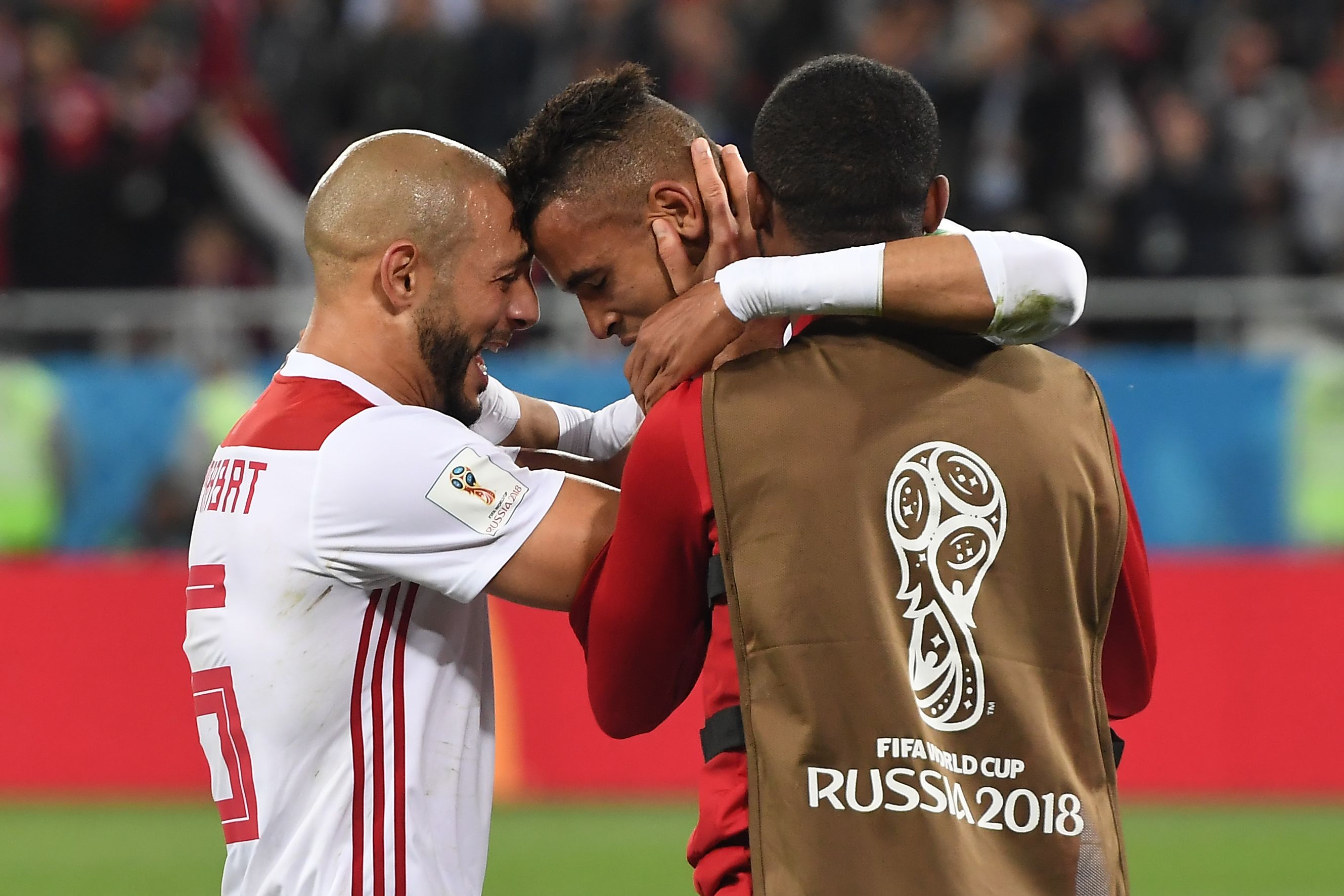Teams are out but World Cup consolidates bonds between the Maghreb and its diasporas
Although Morocco and Tunisia have already been eliminated from the FIFA World Cup in Russia, both Maghrebi teams’ participation in the prestigious tournament had more than a silver lining. Among others, it will probably have a lasting effect on the two North African countries’ ties to their diasporas in Europe.
When the Moroccan and Tunisian football federations started scouting for talented footballers eligible to play in their national teams by virtue of their origin, there was scepticism about drafting Europe-born players of Maghrebi extraction. Many doubted they could integrate into their adopted teams or that they had the emotional bonds needed to rally around the Tunisian or Moroccan flag.
For those who doubted the patriotism of binational players on the two teams, it was surely sufficient to watch the Moroccan team’s star Nordin Amrabat. He stunned football fans around the world because he was not expected to be in the lineup for the June 20 game against Portugal.
Amrabat had suffered a nasty concussion in Morocco’s previous game against Iran but, just a few days after being discharged from the hospital, there he was, wearing a skull cup and valiantly leading his teammates’ attempt to mount a serious comeback against the Portuguese.
From the enthusiasm of the players, it was, in fact, nearly impossible to tell who among them was born in Morocco and who was born abroad. It was not just the Holland-born Amrabat and Mehdi Benatia and Younes Belhanda, both of whom were born in France. No less than 17 of Morocco’s 23 players are foreign-born. Five of them are natives of Holland, while others were born in France, Italy or Spain.
To a great extent, the same applied to Tunisian players. About half of the Tunisian national football team is Europe-born, including French-Tunisians such as Wahbi Khazri, Mouez Hassen, Dylan Mahmoud Bronn, Ellyes Skhiri and Yohan Benalouane.
Doubts about the binationals stemmed from the complex relationship between the Maghreb and its diasporas in Europe. Like most second-generation emigrants of Maghrebi descent, these athletes did not necessarily speak Arabic (or Amazigh, in the case of the Moroccans). These young Europeans of Maghrebi origin grew up in a different culture and achieved varying degrees of socio-economic integration in Europe. Many in the Maghreb long held to the notion that these were “Maghrebi migrants,” just like their parents but they weren’t.
In a stark illustration of that misunderstanding, most Tunisian post-independence governments invested in wooing the children of first-generation immigrants. In many ways, these governments did not seem to accept the fact that these young people were now French, Belgian and German, albeit of Tunisian origin. They were not “Tunisians living abroad” as the Tunisian authorities liked to label them. Meanwhile, they saw economic benefits for the state from migrants’ remittances and investment in Tunisia.
Unlike Arab-Americans, whose hyphenated identity was quickly recognised for what it is, young Europeans of North African descent were all too often expected to behave like Maghrebi natives, as did their parents. The problem was, they weren’t Maghrebi natives.
Even so, second-generation youths of Maghrebi origin never cut the umbilical cord that bound them to their country of origin. Geographic proximity and modern communications technology allowed for continued contact between the second generation and their parents’ birthplace. In fact, it was the parents who often worked to preserve that connection even when their children were reluctant.
Now, playing for the country of their ethnicity is seen to consolidate Europe-born Maghrebis’ ties to their parents’ generation.
Ironically, the impediments to full integration in Europe might have further encouraged second-generation Maghrebis to identify with their North African countries of origin. Maurice Crul, a professor at Vrije Universiteit Amsterdam, told the New York Times: “It’s a big issue that this generation felt excluded from the very start of their lives.” There has been, for instance, the blatant racism and bigotry of populist politicians, such as Geert Wilders, the leader of the Dutch Party for Freedom, who once slandered Moroccans as “scum.”
In some instances, however, choosing between the country of birth and the country of origin was problematic. Players approached by the Moroccan and Tunisian football federations had legitimate considerations about the effects of their choice. In some instances, their preferences were not compatible with the wishes of football bodies in the Maghreb.
The Tunisian football federation, like its Moroccan counterpart, devoted time and effort to convince the players to join the Maghrebi squads. “By enlarging its horizons, the technical staff hopes to create an osmosis between players chosen from the Tunisian championship and those originating from the second generation established in Europe,” the Tunisian federation noted on its website.
In some cases, the players preferred not to jeopardise their chances of playing someday for the national team of their country of birth. In most other cases, however, they were eager to join the Moroccan or Tunisian team.
Eventually, there was a clear sense of solidarity and even complicity between the players regardless of their place of birth. Playing friendlies during Ramadan, the Tunisian team seemed to count on its French-born goalkeeper Mouez Hassen to provoke a playing pause that allowed them to break their fast. Asked by reporters if his complaint about injuries was contrived, Hassen replied: “What can I tell you? I am Muslim.”
Language was never a real handicap. French is a common second language in North Africa. Foreign tongues are not an insurmountable problem in modern football where players often hail from many different backgrounds.
Beyond cultural differences, most players rallied around the flag; and Tunisian player Ellyes Skhiri reflected that spirit: “I was totally welcomed by everyone. There are no concerns. It is true that I do not speak the language yet. I hope to be able to learn it the soonest. That will facilitate my integration.”
Whether he ends up speaking the Arabic language or not, the integration of Skhiri and other foreign-born Maghrebis in their countries of origin is much less in doubt after the FIFA World Cup.
Oussama Romdhani is the chief editor of The Arab Weekly.
Copyright ©2018 The Arab Weekly.







